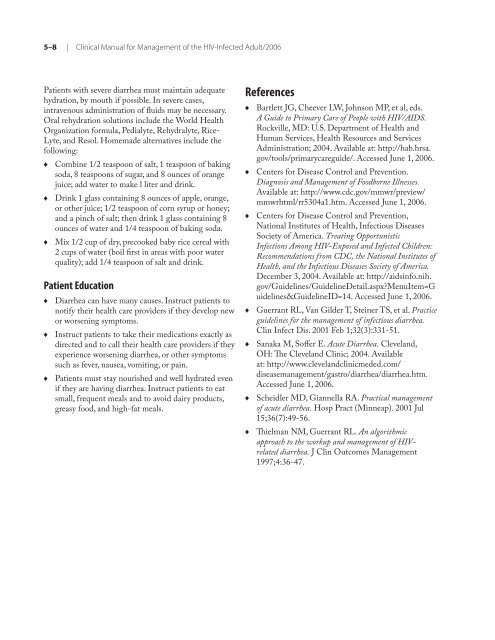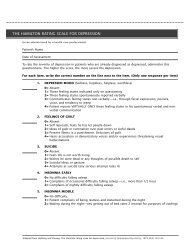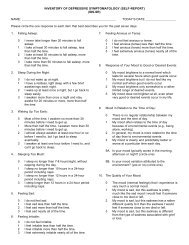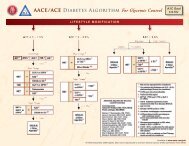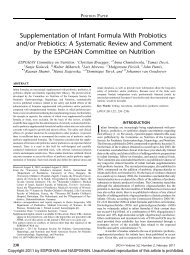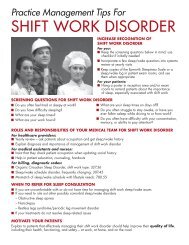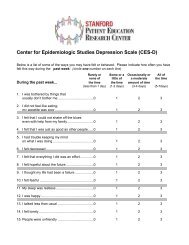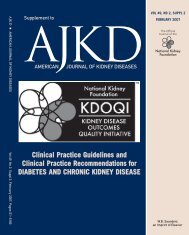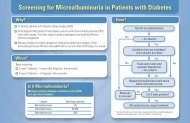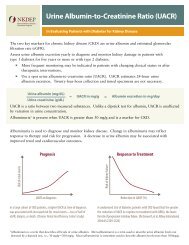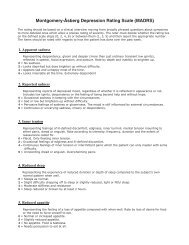Clinical Manual for Management of the HIV-Infected ... - myCME.com
Clinical Manual for Management of the HIV-Infected ... - myCME.com
Clinical Manual for Management of the HIV-Infected ... - myCME.com
You also want an ePaper? Increase the reach of your titles
YUMPU automatically turns print PDFs into web optimized ePapers that Google loves.
5–8 | <strong>Clinical</strong> <strong>Manual</strong> <strong>for</strong> <strong>Management</strong> <strong>of</strong> <strong>the</strong> <strong>HIV</strong>-<strong>Infected</strong> Adult/2006<br />
Patients with severe diarrhea must maintain adequate<br />
hydration, by mouth if possible. In severe cases,<br />
intravenous administration <strong>of</strong> fluids may be necessary.<br />
Oral rehydration solutions include <strong>the</strong> World Health<br />
Organization <strong>for</strong>mula, Pedialyte, Rehydralyte, Rice-<br />
Lyte, and Resol. Homemade alternatives include <strong>the</strong><br />
following:<br />
♦<br />
♦<br />
♦<br />
Combine 1/2 teaspoon <strong>of</strong> salt, 1 teaspoon <strong>of</strong> baking<br />
soda, 8 teaspoons <strong>of</strong> sugar, and 8 ounces <strong>of</strong> orange<br />
juice; add water to make l liter and drink.<br />
Drink 1 glass containing 8 ounces <strong>of</strong> apple, orange,<br />
or o<strong>the</strong>r juice; 1/2 teaspoon <strong>of</strong> corn syrup or honey;<br />
and a pinch <strong>of</strong> salt; <strong>the</strong>n drink 1 glass containing 8<br />
ounces <strong>of</strong> water and 1/4 teaspoon <strong>of</strong> baking soda.<br />
Mix 1/2 cup <strong>of</strong> dry, precooked baby rice cereal with<br />
2 cups <strong>of</strong> water (boil first in areas with poor water<br />
quality); add 1/4 teaspoon <strong>of</strong> salt and drink.<br />
Patient Education<br />
♦<br />
♦<br />
♦<br />
Diarrhea can have many causes. Instruct patients to<br />
notify <strong>the</strong>ir health care providers if <strong>the</strong>y develop new<br />
or worsening symptoms.<br />
Instruct patients to take <strong>the</strong>ir medications exactly as<br />
directed and to call <strong>the</strong>ir health care providers if <strong>the</strong>y<br />
experience worsening diarrhea, or o<strong>the</strong>r symptoms<br />
such as fever, nausea, vomiting, or pain.<br />
Patients must stay nourished and well hydrated even<br />
if <strong>the</strong>y are having diarrhea. Instruct patients to eat<br />
small, frequent meals and to avoid dairy products,<br />
greasy food, and high-fat meals.<br />
References<br />
♦<br />
♦<br />
♦<br />
♦<br />
♦<br />
♦<br />
♦<br />
Bartlett JG, Cheever LW, Johnson MP, et al, eds.<br />
A Guide to Primary Care <strong>of</strong> People with <strong>HIV</strong>/AIDS.<br />
Rockville, MD: U.S. Department <strong>of</strong> Health and<br />
Human Services, Health Resources and Services<br />
Administration; 2004. Available at: http://hab.hrsa.<br />
gov/tools/primarycareguide/. Accessed June 1, 2006.<br />
Centers <strong>for</strong> Disease Control and Prevention.<br />
Diagnosis and <strong>Management</strong> <strong>of</strong> Foodborne Illnesses.<br />
Available at: http://www.cdc.gov/mmwr/preview/<br />
mmwrhtml/rr5304a1.htm. Accessed June 1, 2006.<br />
Centers <strong>for</strong> Disease Control and Prevention,<br />
National Institutes <strong>of</strong> Health, Infectious Diseases<br />
Society <strong>of</strong> America. Treating Opportunistic<br />
Infections Among <strong>HIV</strong>-Exposed and <strong>Infected</strong> Children:<br />
Re<strong>com</strong>mendations from CDC, <strong>the</strong> National Institutes <strong>of</strong><br />
Health, and <strong>the</strong> Infectious Diseases Society <strong>of</strong> America.<br />
December 3, 2004. Available at: http://aidsinfo.nih.<br />
gov/Guidelines/GuidelineDetail.aspx?MenuItem=G<br />
uidelines&GuidelineID=14. Accessed June 1, 2006.<br />
Guerrant RL, Van Gilder T, Steiner TS, et al. Practice<br />
guidelines <strong>for</strong> <strong>the</strong> management <strong>of</strong> infectious diarrhea.<br />
Clin Infect Dis. 2001 Feb 1;32(3):331-51.<br />
Sanaka M, S<strong>of</strong>fer E. Acute Diarrhea. Cleveland,<br />
OH: The Cleveland Clinic; 2004. Available<br />
at: http://www.clevelandclinicmeded.<strong>com</strong>/<br />
diseasemanagement/gastro/diarrhea/diarrhea.htm.<br />
Accessed June 1, 2006.<br />
Scheidler MD, Giannella RA. Practical management<br />
<strong>of</strong> acute diarrhea. Hosp Pract (Minneap). 2001 Jul<br />
15;36(7):49-56.<br />
Thielman NM, Guerrant RL. An algorithmic<br />
approach to <strong>the</strong> workup and management <strong>of</strong> <strong>HIV</strong>related<br />
diarrhea. J Clin Out<strong>com</strong>es <strong>Management</strong><br />
1997;4:36-47.


